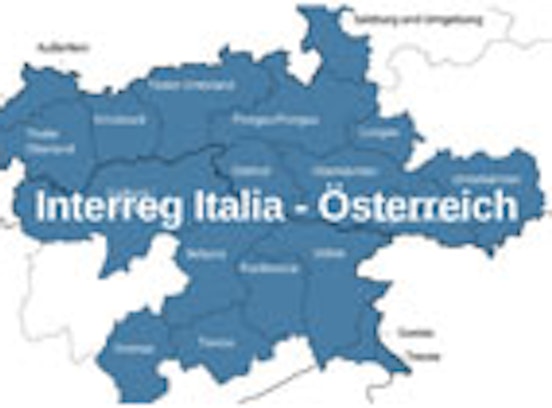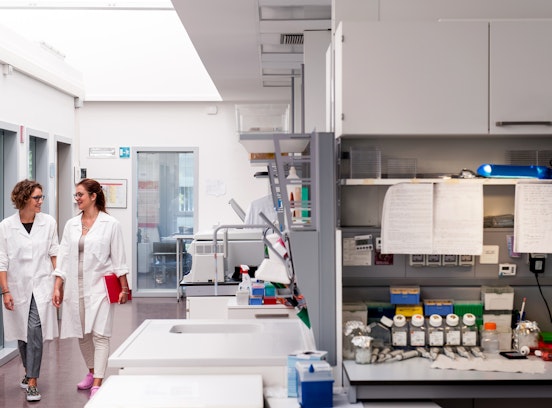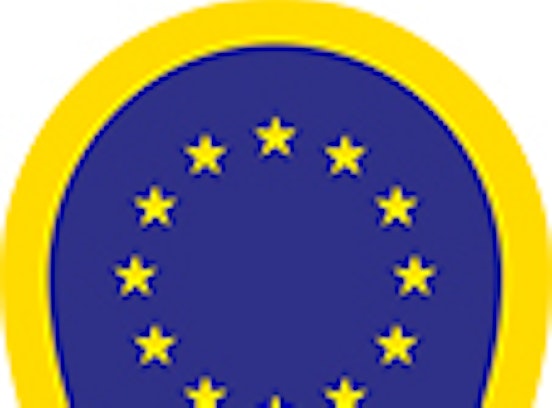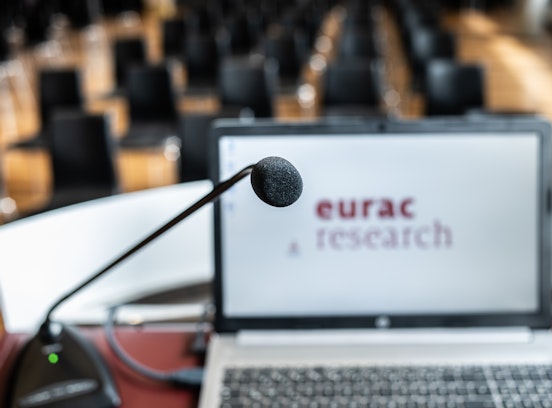EPICIR
Epigenetics of Immunity in Cancer
- Project duration: -
- Project status: finished
- Funding: Italy-Austria 2014-2020 (EUTC / EU funding / Project)
- Total project budget: €288,625.00
- Institute: Institute for Biomedicine
Cancer is characterized by uncontrolled cell growth, which can spread to otherwise healthy tissue and organs. Only five to ten percent of cancers are caused by inherited genetics, the majority of the cases are triggered by external factors such as tobacco consumption, diet, infections, or radiation. These external factors may induce so-called epigenetic changes, which may result in cancer cells being no longer recognized by the immune system. Cancer cells thus "hide" from the immune system.
However, some of these epigenetic changes are reversible, and that's where the scientists are going to act on. Utilizing inhibitory compounds (in short, inhibitors) allows prevention of these changes and reactivate previously deactivated genes, so that the immune system can retake action and remove degenerated cells.
The "Epigenetics of Immunity in Cancer" (EPIC) project was started in September 2019, focusing on histone deacetylase (HDAC) inhibitors. The research team comprises of chemists, clinicians, biologists, and bioinformaticians from the universities of Udine, Salzburg, and Trieste, as well as the Institute for Biomedicine at Eurac Research in Bolzano. The team is testing the effect of HDAC inhibitors in cancer cells and their suppressive role in tumor progression. In particular, the University of Udine is checking HDAC inhibition based on a library of HDAC compounds, whereas the University of Trieste is optimizing promising compounds with the aid of computer programs followed by their synthesis. At the University of Salzburg, selected inhibitors are being tested in cell models with respect to their influence on the immune system. Data generated by all partners are shared with bioinformaticians at Eurac Research, who are tasked with their analysis. Invoking next generation sequencing methods, the differences between cancer cells with and without inhibitors are measured: which genes are active, where are they active and what consequences could these compounds have in the human organism. Data obtained from theses analyses are compared to international databases in order to gain additional knowledge on cancer development. In this way, the three-year lasting project is supposed to create the basis for novel advances in cancer immune therapy.
Funding
This project is funded by the European Regional Development Fund and the Interreg V-A Italia-Österreich 2014-2020

News
2024-03-22
Publication
It's more than a year ago that the EPIC project was officially closed, but we have kept on analyzing data. Our former project empolyee Dr. Kerschbamer has transfered to the Udine partner lab and continued her work in collaboration with Dr. Gagliano on DNA accessibility changes induced by HDAC inhibitors in patients with colorectal cancers. The results of this work have been published in early March as an open access article in the journal Biomedicine & Pharmacotherapy.
2023-11-09
We continue!
On October 20th, the central secretary of the Interreg office in Bolzano/Bozen announced the list of grants approved in this round of financing.
And our SENECA project is in it! We therefore are preparing for the project start and soon we will post news on the new SENECA blog.
2023-04-19
Will there be a continuation?
Today at noon was the deadline for handing in proposals for the first round of the new Interreg VI-A IT-AT 2021-2027 program. Still having an active partner network, we have submitted a project called SENECA: it aims to characterize the influence of an ageing cellular system, in particular an ageing immune system on the development of cancer. There are compounds that dampen the ageing effect in cells, and in a a second step, we want to improve these agents and study their effect on a holistic cellular level. Fingers crossed!
2023-02-07
Publication
Despite the project officially closed, January has still been a busy month for EPIC collaborators. We dealt with the annual reporting and worked on revising a manuscript on acute myeloid leukemia (AML) driven by Jutta Horejs-Hoeck's lab in Salzburg. We are happy to announce that this work on HDAC inhibitors in AML cell lines has been published today in the scientific journal Cancers.
2023-01-16
End of project
The EPIC project was officially closed with the end of 2022. We are currently working on the yearly report and some publications. Smaller updates will continue to be published here.
2022-11-06
Reunion in Bolzano
It was in Udine on Oct 21, 2019 that the EPIC project team has met each other the first time. Nobody would have thought that the next time we would see again in person in more than three years - this year on Nov 4th and 5th we were glad to face all partners of the EPIC project during our meeting at NOI tech park, also showcasing our new home of the Institute of Biomedicine. The program was packed with talks and discussions, that vividly went on during our törggelen visit at Oberfinser in Waidbruck/Lajen. The EPIC project is going to end by December 2022, but we are all excited to participate in the new Interreg IT-AT call coming up soon.
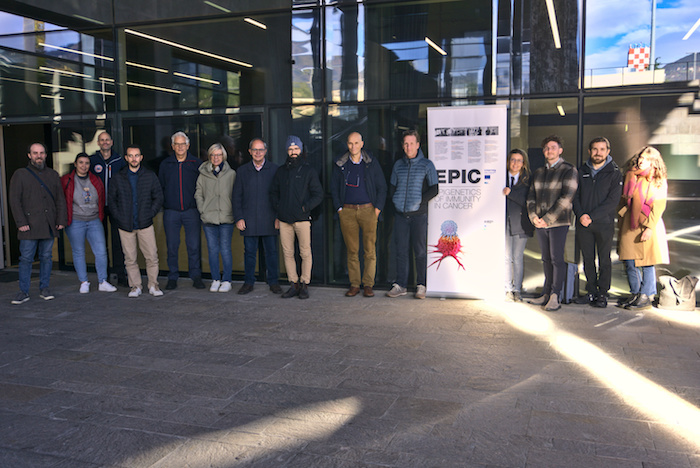
2022-10-28
EPIC workshop in Bolzano
On Friday and Saturday, Nov. 4th and 5th, we are gathering in person for our last EPIC workshop before the project ends. The workshop will be held at NOI/Bolzano and we are looking forward to discussing exciting science with our partners and enjoy the possibility of personal exchanges with the members of our network.
2022-09-01
A story on cancer research
Based on the content of our press release in late March this year we were contacted by Nicole Dominique Steiner, chief editor of "Die Chance"/"La Chance", a local journal published by Cancer Aid South Tyrol. This resulted in a story from the perspective of cancer patients and has been published in the August 2022 edition (or find it in the 2022 archive).
2022-03-22
Publication
A pharmacological compound termed "NKL54" changes the epigenetic program in leiomyosarcoma cells: Nucleid Acids Research (NAR) accepted our publication and it went in print yesterday. Want to know more without reading the paper? We happily provide a summary in english and for our German and Italian readers, we have a press release.
2022-01-13
EPIC in its final year
Welcome to 2022, the last year of the EPIC project. Far from having in mind to finish soon, we have recently submitted the inhibitor manuscript after a big revision phase once again to the Nucleic Acids Research (NAR) journal (see our blog from 2021-07-26). Further, our collaboration with the immunology group in Salzburg has been refreshed: a mass spectrometer proteomics dataset will be used to investigate the effect of two HDAC inhibitors on the protein production in acute myeloid leukemia (AML) cells.
2021-10-22
Thanks for coming to NOI
It was great to see so many interested visitors at our EPIC booth at NOI techpark both on Friday and Saturday. We have talked to many curious students and were asked interesting questions by a broad range of people. Thanks to Emanuela Kerschbamer for taking over the Italian part of our German/Italian presentations! We also have our two animations available for download: move histone-dna.mp4 shows the nucleosome where DNA is wrapped around histone proteins. Movie hdac-saha.mp4 shows an HDAC protein with inhibitor SAHA blocking its catalytic site. Both movies are best viewed in an infinite loop in your favorite movie player.
2021-10-13
EPIC at NOI project fair
Curious about the EPIC project? Want to hear more and talk to us?
The yearly EFRE project fair on October 22nd is the perfect opportunity to meet us, we are presenting EPIC at booth 13. See you there.
2021-08-10
EPIC project will be prolonged
Today we have received the OK from our Interreg funding agency: we can extend the EPIC project by nine months, the new end will be December 31st, 2022. This is absolutely great news and we are happy to catch up the lost time caused by the shutdowns and slowdowns during the pandemy.
2021-07-26
Manuscript submission
Finally, we have submitted our manuscript where we have compared cellular response to various HDAC inhibitors utilizing RNA-seq, ChIP-seq, and various chemical assays. The work is very comprehensive, by the end focussing on a small inhibitor called NKL54, so we aimed very high and submitted to Nucleic Acids Research (NAR). Fingers crossed!
2021-07-19
Third virtual workshop with all partners
Today was our third interregional workshop. Partners from Salzburg and Udine presented their activities, but unfortunately Trieste was absent due to illness. We are wishing a quick recovery and are looking forward to a new date to see what's up in Trieste. Dr. Kerschbamer gave an elaborate presentation summarizing her contributions on the RNA-seq manuscript and two smaller investigations for the immunology group in Salzburg. The great thing here is that the latter was driven by the outcome of the former: insights from the RNA-seq experiments were translated to possible lab work on the immunology side!
2021-07-09
Announcing Fall Symposium
We are preparing an online symposium with free participation. It will be held on Oct 5th at 2pm CET. There are going to be a total of five talks. Stay tuned for further information on this blog.
2021-05-28
Science administration
Most people think of scientists working at the lab bench, performing experiments or sitting in front of the computer working on theoretical
problems. And this is mostly true. However, science also needs to be
administrated. Planning, coordination and reporting to the stakeholder are the
tasks that are performed at the (home) office desk. Since EPIC is financed by
Interreg V-A Italy-Austria, which is a dedicated
regional EU fund, there clearly is a proper interest on our activities from the
funding agency's perspective. Is the project progressing as documented in the
proposal? Do the different partners cooperate productively? How is the
budget spent? Every half a year all partners are thus submitting their
progress reports (coordinated by the lead partner in Udine) to their regional
funding offices for evaluation. And that's exactly what we are currently doing
here at the end of May: we formally demonstrate the progress made in our EPIC
project.
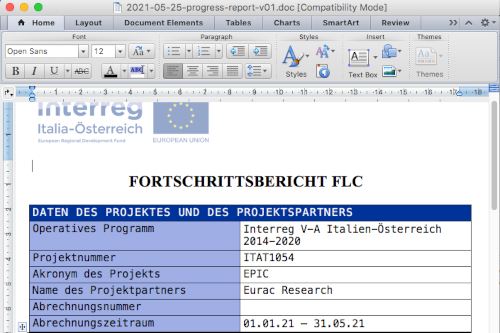
2021-05-18
Congrats, Emanuela!
Today is a special day: Dr. Kerschbamer joined the EPIC team exactly a year ago.
2021-02-04/02-23/04-01/04-16
Online meetings with Udine partner
It's paper writing time. We have already had a series of meetings with the Lead Partner in Udine, who is also the driving force behind the manuscript. We are interpreting gene expression changes of leiomyosarcoma cells in different classes of HDAC inhibitors, which were the basis for the RNA-seq experiments mentioned earlier. We might have some interesting candidate genes, that's something we need to dive into a bit more, though. Overall, it looks like we have an interesting wetlab/bioinformatics paper growing here these days.
2020-12-23
Online meeting with Udine partner
Last working day in this year and still fully focused on EPIC with another meeting. Today we had a look at the commonalities in gene expression change between different HDAC inhibitors. It is interesting to see a big expression landscape change already after 6 hours past inhibition. Maybe the commonalities will lead us to some sort of a first simple HDACi signature.
2020-12-11
Online meeting with Udine partner
In the beginning of October we have received our first RNA-seq dataset from Udine. A couple of samples were re-sequenced and now it's time to look at it in more detail than we could spend in our virtual workshop. Today we compared two orthogonal approaches to analyzing the sequencing data and agreed on the next steps. Another meeting briefly before Christmas will serve as a follow-up.
2020-12-03
Second virtual workshop with all partners
Today we had our second meeting with all network partners. Needless to say, it was online again. We have seen a total of seven presentations in the course of this four hour meeting. It's great to see how the different threads in the project converge to the overall goal of improving HDAC inhibition. Dr. Kerschbamer has summarized our ongoing collaborative work with Salzburg and then went into detail on her RNA-seq analysis, where she has investigated the cellular response to HDAC inhibition looking at a dataset originating from the Udine lab.
2020-10-21
Online meeting with Salzburg collaborators
In our monthly get together with our partners from Salzburg, we have identified an interesting experimental setup that can use the transcription factor binding data we have obtained recently and discussed during the meeting.
2020-10-08
First dataset has arrived
We have received our first transcriptome dataset from the Udine partner. It contains experiments on several HDAC inhibitors and a time series of RNA production in cells after 6 and 24 hours of treatment.
2020-09-16
Online meeting with Salzburg collaborators
Off into the next round of scientific exchange with our lab partners from Salzburg. This time Dr. Kerschbamer has presented her test runs of software that can assign immune cell types from a mixture of RNA-sequenced cells, in this case we have chosen to look at colorectal cancer samples. She further demonstrated how we can use our immune system gene panel on restricting output from differential gene expression data.
2020-08-05
Poster has arrived
Even though most of us are in their smart offices at home, from time to time we
are visiting our workplace. What a coincidence, today we spent a day at work and
our EPIC poster has finally arrived freshly from the press.
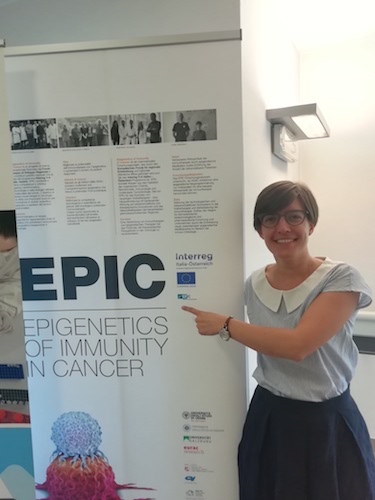
2020-08-05
Next online meeting with Salzburg collaborators
Our goal is to meet with our network partners in Salzburg on a monthly basis. Today was the follow-up meeting and Dr. Kerschbamer gave a presentation on immune system gene expression in various cancer tissues.
2020-07-15
Intensification of collaboration with Salzburg
After last meeting with all partners we have realized that the partners in Salzburg do have a couple of interesting scientific questions which we in Bolzano can help to answer. So today was the first online meeting between Bolzano and Salzburg, fortifying the north-south axis of our network. In this meeting, we have established closer contact and started to understand better what are the details of the questions that the Salzburg groups are currently working on. Dr. Kerschbamer provided an update of the talk she has given two weeks ago during the partner meeting.
2020-07-01
First online meeting of all groups
During the last couple of months, science has seen a big change. Many conferences became online events, and we have seen that this type of meeting works pretty well. Sure, we are all missing out the personal contacts that usually are groomed during such events, but scientific content remains excellent.
The same happened in our EPIC network. We have planned a meeting in Trieste in June, but this has been postponed to some later date and we have now held the first online meeting on Cisco's WebEx platform (provided by the Salzburg partners). We got updates on the progress made from each partner and even after 1.5 months, Dr. Kerschbamer from our BZ EPIC team could give a presentation with first analyses of public cancer databases.
2020-05-20
Udine has partially opened labs again
After more than two month of lockdown, the labs of our partners are slowly opening. Udine is currently reopening the lab with reduced personnel and working shifts. Others will follow this model.
2020-05-18
Welcome Dr. Emanuela Kerschbamer
Our main bioinformatician for data analysis has arrived at Eurac. A very warm
welcome to Emanuela Kerschbamer. Dr. Kerschbamer is trained in both the wet lab
and in-silico analyses. She has studied biology and functional genomics in
Bologna and Trieste, and got her PhD from the Univ. of Padua when working for
the Research and Innovation Centre at Edmund Mach Foundation in San Michele
all'Adige. Furthermore, she has been visiting scientist in Paris and Boston and
after several years of post-doc work at the Univ. of Trento, she joined the EPIC
team in May 2020. 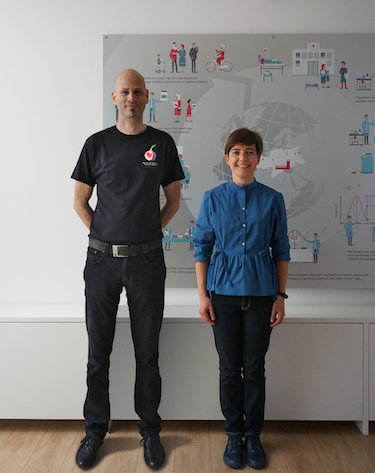
2020-03
SARS-CoV-2 hits EPIC
Lockdown due to the rising pandemic has also hit the EPIC project. Laboratories have been closed, people are starting to work remotely. Lots of experimentalists around the world are becoming concerned that research will stale. Without access to the labs, we will have difficulties in moving forward our experiments. At the moment we can catch up on literature, perform some planning and do administrative work. For us bioinformaticians it is easy to stay home and work from there, but without getting data from the lab, we have to continue tapping external databases and mine them. Let's hope our biologists can return to the lab in not too long time.
2020-02-11
Server arrived
Our number crunching server has arrived. It's time to set it up and get some
test runs done on it. Let's see how the sequencing pipelines scale on this
machine.
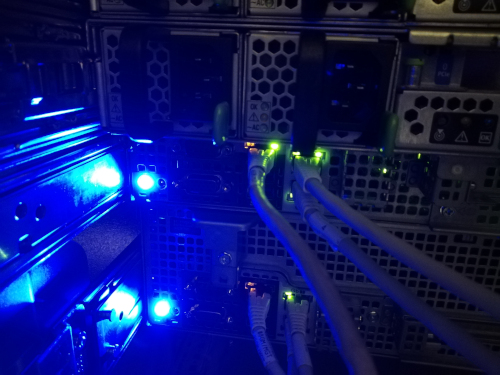
2019-11-13
First encounter with Bolzano administration
Our local grant administrators in Bolzano have invited all new Interreg project PIs to their office. We have given an overview on cancer and histone acetylases, deacetylases and how inhibition might help improve the immune system attacking cancer cells.
2019-10-21
Meet and greet in Udine
Our lead partner in Udine, Claudio Brancolini, has invited all collaborators to join a kickoff meeting. It was good to see all principal investigators (PI) and the students involved in the network. Each PI has briefly presented his/her field of expertise and how they plan to contribute to the project. We have also been informed about important administrative issues.
2019-10-14
Looking for a motivated researcher to join the EPIC team
The EPIC project has started at the end of September. Hiring is going on in all labs and we are also looking for a post-doc to join the EPIC team. See our jobs page for the current call.
Gagliano T, Kerschbamer E, Baccarani U, Minisini M, Di Giorgio E, Dalla E, Weichenberger CX, Cherchi V, Terrosu G, Brancolini C (2024)
Elsevier BV
Journal article
Biomedicine and Pharmacotherapy
More information: http://dx.doi.org/10.1016/j.biopha.2024.116374
Luciano M, Sieberer H, Krenn PW, Dang HH, Vetter J, Neuper T, Amend D, Blöchl C, Weichenberger CX, Eglseer A, Unger MS, Andosch A, Steiner P, Neureiter D, Bauer R, Hummer L, Tesanovic S, Binder S, Elmer DP, Strandt H, Schaller S, Strunk D, Pleyer L, Greil R, Winkler S, Hartmann TN, Schmidt-Arras D, Huber CG, Aberger F, Horejs-Hoeck J (2024)
Springer Science and Business Media LLC
Journal article
Cell Communication and Signaling
More information: http://dx.doi.org/10.1186/s12964-024-01777-6
Urwanisch L, Unger MS, Sieberer H, Dang HH, Neuper T, Regl C, Vetter J, Schaller S, Winkler SM, Kerschbamer E, Weichenberger CX, Krenn PW, Luciano M, Pleyer L, Greil R, Huber CG, Aberger F, Horejs-Hoeck J (2023)
MDPI AG
Journal article
Cancers
More information: http://dx.doi.org/10.3390/cancers15041039
Steiner ND, Kerschbamer E, Weichenberger CX (2022)
Journal article
Die Chance
More information: https://krebshilfe.it/de/archiv-chance/chance-2022.html
Steiner ND, Kerschbamer E, Weichenberger CX (2022)
Journal article
Die Chance
More information: https://krebshilfe.it/it/archivio-chance/chance-2022.html
Kerschbamer E, Weichenberger CX (2022)
Internet
More information: https://www.msn.com/it-it/notizie/tecnologiaescienza/eurac-r ...
Kerschbamer E, Weichenberger CX (2022)
Internet
More information: https://www.altoadigeinnovazione.it/eurac-4/
Kerschbamer E, Weichenberger CX (2022)
Internet
More information: https://www.suedtirolnews.it/chronik/studie-zur-umprogrammie ...
Kerschbamer E, Weichenberger CX (2022)
Internet
More information: https://www.ansa.it/trentino/notizie/qualitaaltoadige/2022/0 ...
Kerschbamer E, Weichenberger CX (2022)
Newspaper
Alto Adige
Kerschbamer E, Weichenberger CX (2022)
Newspaper
L'Adige : quotidiano del Trentino Alto-Adige
Minisini M, Di Giorgio E, Kerschbamer E, Dalla E, Faggiani M, Franforte E, Meyer-Almes FJ, Ragno R, Antonini L, Mai A, Fiorentino F, Rotili D, Chinellato M, Perin S, Cendron L, Weichenberger CX, Angelini A, Brancolini C (2022)
Oxford University Press (OUP)
Journal article
Nucleic Acids Research
More information: http://dx.doi.org/10.1093/nar/gkac081

